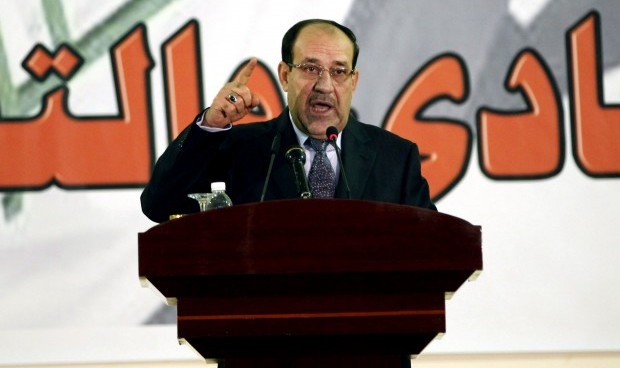
Iraq’s prime minister, Nuri Al-Maliki, speaks during a ceremony at the police academy in Baghdad on January 9, 2013. (AP Photo /Hadi Mizban)
Baghdad, Asharq Al-Awsat—Iraqi Prime Minister Nuri Al-Maliki has failed to appear before parliament for the second time in a single week, sparking a political crisis between the office of the prime minister and the parliament, Asharq Al-Awsat has learned.
State of Law coalition MP Ali Shallah told Asharq Al-Awsat that “according to parliament’s rules of procedure, the prime minister decides the timing of his appearance [before parliament]. Based on this, Iraq’s minister of state for parliamentary affairs, Safa Al-Din Al-Safi, issued an official letter from the government to parliamentary speaker Osama Al-Nujaifi confirming that Prime Minister Nuri Al-Maliki will decide the timing of this visit at a future date.”
The MP added, “Parliament has adjourned until April 23, in other words until after the provincial elections. The prime minister’s appearance [before parliament] will go ahead after this.”
A special parliamentary session had been scheduled for last Monday, to be attended by Maliki and a number of senior security figures, to discuss the security deterioration taking place in the country. However, Maliki opted to participate in a conference with South Korean companies planning to invest in Iraq instead of attending parliament to discuss the security situation.
Senior State of Law coalition member Adnan Al-Saraj told Asharq Al-Awsat: “Maliki requested a meeting with parliament on more than one occasion, but the problem is that some political parties and trends do not want to discuss the situation that the country is passing through in the right way, but rather in the manner that they want.”
He added, “There are mechanisms that precede the prime minister’s meeting with parliament that have not been dealt with … such as reaching an agreement on the nature and mechanism of the questions. There are also MPs inside parliament who confuse meeting with the prime minister with interrogating him.”
Al-Saraj also informed Asharq Al-Awsat that Maliki believes that certain parties are seeking to politicize the issue for their own benefit. He added that some MPs have only avoided facing official charges due to parliamentary immunity, stressing that Maliki therefore does not want to “fall into a trap.”
The State of Law coalition said that if parliament wants Maliki to appear before them then the “mechanism for this must be implemented in the right way, particularly as Maliki called for this meeting to be held in secret and limited attendance to party leaders,” adding that these conditions were not met.
Maliki has devoted the past week to promoting his electoral campaign in Iraq’s central provinces, particularly Karbala and Najaf. During this time, Maliki put forward the idea of ending the governmental coalition and forming a majority government, calling for parliamentary elections to be held in the next three or four months.
In exclusive statements to Asharq Al-Awsat, State of Law coalition MP Shakir Al-Daraji emphasized that “the country is now in an unenviable position; there are political blocs working to disrupt the state’s institutions, particularly the government, and this has had a negative impact on the services that the government is striving to provide the people.”
He added, “Our previous experiences have demonstrated that national partnership has failed, and has not achieved what was required, and so we must look at alternatives, particularly a political majority government.”
